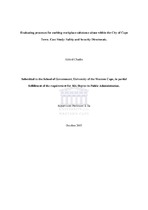Evaluating processes for curbing workplace substance abuse within the city of Cape Town. Case study: safety and security directorate.
Abstract
The City of Cape Town Municipality is the implementing agent of service delivery and developmental programmes. The importance and impact of the services and programmes are imperative to the citizens it serves; thus, the standard of work and efficiency provided by public officials is instrumental in achieving set priorities. Workplace substance abuse hampers service delivery and can cause damage to the employee, the public as well as the Municipality. Accidents, injuries or inability to perform functions by employees may have tremendous legal, financial and social repercussions for the City of Cape Town. This study seeks to evaluate efficacy of processes that seek to curb the existence of workplace substance abuse in the City of Cape Town, specifically within the Safety and Security Directorate. A qualitative and quantitative research methodology was applied. A combination of quantitative questionnaires, qualitative semi-structured interviews and focus group discussions were employed with employees in the Safety and Security Directorate. A purposeful sample was selected. The study results indicate that there is a prevalence of employees reporting for duty with a ‘hangover’. This is accepted as the norm, and staff are protected by their colleagues. The participating departments, Fire and Rescue Service and Metro Police, have highly stressful and traumatic working environments for staff to work in. There is a lack of debriefing and regular counselling after call-outs. Staff feel that management does not care and are tardy in providing support to them. A lack of trust between management and staff and among staff exists. The paper concludes with recommendations for each of the research findings.

